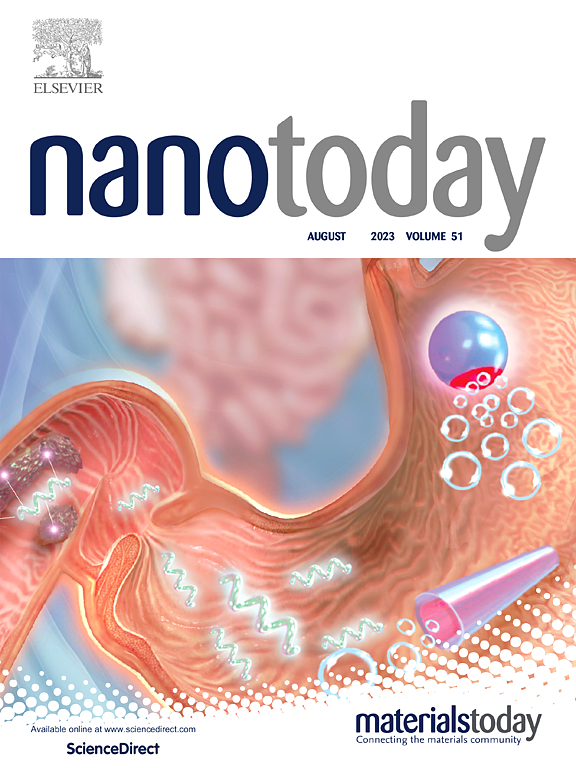Targeting ferroptosis with polymerized platinum (IV) prodrugs nanoparticles with everolimus for enhancing therapeutic efficacy on cholangiocarcinoma
IF 13.2
1区 材料科学
Q1 CHEMISTRY, MULTIDISCIPLINARY
引用次数: 0
Abstract
Strategies to induce ferroptosis in tumor cells have been widely adopted for the treatment of cancer. Traditional single-target ferroptosis inducers, however, have shown limited efficacy. Tumor cells often counteract these drugs through mechanisms by high levels of glutathione (GSH) detoxification of lipid peroxidases. To address these challenges, we have developed a GSH-responsive amphiphilic polymer with polymerized platinum(IV) prodrugs (Poly-CisPt (IV)), capable of encapsulating everolimus (a mTORC1 inhibitor) into nanoparticles (NP@Ev). This strategy facilitates the concurrent depletion of GSH and the release of cisplatin and everolimus. On the one hand, the released cisplatin simultaneously induces cell apoptosis and impairs the GPX4 enzyme. On the other hand, everolimus disrupts the mTOR signaling pathway, inhibiting tumor cell proliferation and inducing the production of reactive oxygen species (ROS) and lipid peroxides, which leads to mitochondrial dysfunction and ferroptosis. Our study indicated that NP@Ev effectively induced ferroptosis and significantly inhibited the progression of human cholangiocarcinoma in murine models, with limited toxicity. These findings underscore the potential of NP@Ev as a promising avenue for the clinical multimodal treatment of cholangiocarcinoma.
利用聚合铂(IV)原药纳米颗粒和依维莫司靶向铁蛋白沉积,提高对胆管癌的疗效
在肿瘤细胞中诱导铁变态反应的策略已被广泛用于治疗癌症。然而,传统的单靶点铁氧化诱导剂的疗效有限。肿瘤细胞往往通过高水平谷胱甘肽(GSH)解毒脂质过氧化物酶的机制来对抗这些药物。为了应对这些挑战,我们开发了一种具有 GSH 响应性的两亲聚合物,其中含有聚合铂(IV)原药(Poly-CisPt (IV)),能够将依维莫司(一种 mTORC1 抑制剂)封装到纳米颗粒(NP@Ev)中。这种策略有助于同时消耗 GSH 以及释放顺铂和依维莫司。一方面,释放出的顺铂可同时诱导细胞凋亡并损害 GPX4 酶。另一方面,依维莫司会破坏 mTOR 信号通路,抑制肿瘤细胞增殖,诱导活性氧(ROS)和脂质过氧化物的产生,从而导致线粒体功能障碍和铁变态反应。我们的研究表明,NP@Ev 能有效诱导小鼠模型中的铁变态反应,并显著抑制人类胆管癌的进展,且毒性有限。这些研究结果表明,NP@Ev有望成为临床多模式治疗胆管癌的一种有效途径。
本文章由计算机程序翻译,如有差异,请以英文原文为准。
求助全文
约1分钟内获得全文
求助全文
来源期刊

Nano Today
工程技术-材料科学:综合
CiteScore
21.50
自引率
3.40%
发文量
305
审稿时长
40 days
期刊介绍:
Nano Today is a journal dedicated to publishing influential and innovative work in the field of nanoscience and technology. It covers a wide range of subject areas including biomaterials, materials chemistry, materials science, chemistry, bioengineering, biochemistry, genetics and molecular biology, engineering, and nanotechnology. The journal considers articles that inform readers about the latest research, breakthroughs, and topical issues in these fields. It provides comprehensive coverage through a mixture of peer-reviewed articles, research news, and information on key developments. Nano Today is abstracted and indexed in Science Citation Index, Ei Compendex, Embase, Scopus, and INSPEC.
 求助内容:
求助内容: 应助结果提醒方式:
应助结果提醒方式:


